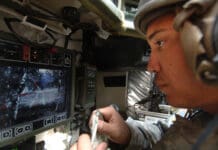This post is also available in:
 עברית (Hebrew)
עברית (Hebrew)
The UK has made a significant advancement in aviation technologies by completing the first-ever commercial flight trials with advanced quantum-based navigation systems. These systems are said to enable aircraft communication that cannot be jammed or spoofed by hostile forces.
The new quantum-based PNT system (Positioning, Navigation, and Timing) was developed by quantum technology company Infleqtion and tested by the Ministry of Defense with aerospace companies BAE Systems and QinetiQ. The companies claim this could help ensure that the thousands of flights going around the world every day could proceed without disruption in case of GPS jamming attacks.
Dr. Timothy Ballance, president of Infleqtion UK said in a public statement: “The successful flight trials demonstrate the potential of quantum technology in overcoming navigation system challenges, which is an exciting development for future applications in the aerospace industry and beyond.”
According to Interesting Engineering, the researchers showed two advanced quantum technologies in a series of test flights: a tightly contained ultra-cold-atom-based quantum system and a small Tiqker optical atomic clock, which reportedly ensures continuous access to precise timing for data centers and telecommunications infrastructure that rely on GNSS/GPS-based timing solutions.
Infleqtion claims this system will transform PNT’s capabilities and provide unparalleled precision and reliability, as it operates autonomously and does not rely on conventional GPS-based satellite navigation. They also explain that PNT systems are vital in determining location, aiding navigation, and maintaining accurate timekeeping, and precision clocks are at the core of the technology.
The aforementioned tests are part of a UK project that is meant to develop quantum sensors to address the UK’s significant dependency on GNSS/GPS for timing, navigation, and location data. This dependency is dangerous as it poses a risk to vital defense, economic, and geopolitical operations due to the possibility of a single point of failure (like the jamming or spoofing of GPS signals).
“These trials are an important step forward in developing quantum technology that could ultimately offer a significant military advantage. Knowing reliably and precisely when and where any asset and sensor system are, feeds into additional options for platform design and capability,” concluded the Sensing Technology Lead at BAE Systems Henry White.

























